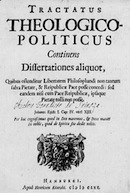
Source: Theologico-Political Treatise - Chapter I. of Prophecy
Spinoza's Chapter 1. - miracles are unusual natural events whose cause is unknown (Page 3)
 If the Jews were at a loss to understand any phenomenon, or were ignorant of its cause, they referred it to God. Thus a storm was termed the chiding of God, thunder and lightning the arrows of God, for it was thought that God kept the winds confined in caves,
If the Jews were at a loss to understand any phenomenon, or were ignorant of its cause, they referred it to God. Thus a storm was termed the chiding of God, thunder and lightning the arrows of God, for it was thought that God kept the winds confined in caves,
In like manner miracles were called works of God, as being especially marvellous; though in reality, of course, all natural events are the works of (Deus sive Natura). The Psalmist calls the miracles in Egypt the works of God, because the Hebrews found in them a way of safety which they had not looked for, and therefore especially marvelled at.
As, then, unusual natural phenomena are called works of God, and trees of unusual size are called trees of God, we cannot wonder that very strong and tall men, though impious robbers and whoremongers, are in Genesis called sons of God.
This reference of things wonderful to God was not peculiar to the Jews. Pharaoh, on hearing the interpretation of his dream, exclaimed that the mind of the gods was in Joseph. Nebuchadnezzar told Daniel that he possessed the mind of the holy gods; so also in Latin anything well made is often said to be wrought with Divine hands, which is equivalent to the Hebrew phrase, wrought with the hand of God.